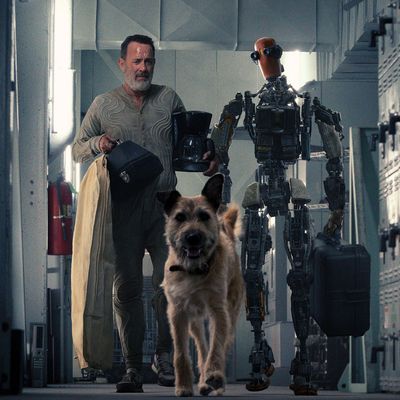
Finch is probably about as American a dystopian narrative as we’re ever likely to get: Tom Hanks plays a terminally ill man, one of the last surviving humans on a shattered Earth, who attempts to build an intelligent robot to take care of his beloved dog after he’s gone. Humanity has been mostly incinerated by a stray solar flare; almost all other plant and animal life appears to be gone; and our hero is subsisting on whatever stray bits of canned food he can find whenever he’s not coughing up blood … but so long as the pup makes it out alive, a happy ending remains possible. Therefore, seemingly all the collected knowledge of our species is channeled into the creation of an elaborate, artificially intelligent dog-sitter for the post-human world. It’s like a grim, gritty, slow-motion variation on all those disaster-movie explosions where the family pet leaps out of the enormous fireball at the last minute and everybody breathes a sigh of relief even as the entire Eastern Seaboard is wiped out.
The very idea is so tear-jerking on so many levels that a filmmaker runs the risk of turning off the audience by leaning too hard in any direction. That’s where Hanks comes in. The actor’s renaissance in recent years as an America’s Dad figure isn’t just another irrational indulgence of our social-media-addled civilization; it has to do with the particular blend of pathos and confidence he has been exuding as a performer since his middle age. Hanks is a can-do actor for a can’t-do era: In movies like Cast Away and Captain Phillips and Saving Private Ryan and last year’s Greyhound, he conveys an undercurrent of helplessness and fragility even as he gets on with it; that makes him a deeply human, relatable hero, suggesting that one needs not stoicism or expertise or muscles to succeed against insurmountable odds, but rather decency and vulnerability.
As Finch Weinberg, a lonely man living in a blasted world where holes in the sky have rendered sunlight radioactive, Hanks is basically an average guy who has found himself in an untenable situation. Puttering around an abandoned lab, he cuts up encyclopedias and other books to scan into a computer that will somehow feed all this knowledge into the soon-to-be-sentient mind of “Jeff,” a robot that (Finch hopes) can learn how to survive in this world and take care of his dog, Goodyear. Finch is apparently an engineer — he’s built a number of motorized and automated objects and doodads, including a loyal, WALL-E-like robotic shopping cart named Dewey — but as played by Hanks, he feels like he could have just walked in off the street, an ordinary man for extraordinary times.
Much of the film involves a road trip Finch and his nonhuman companions take across the country in his RV toward San Francisco, after one of the apocalyptic storms that now regularly pound the planet forces them to flee their home base of St. Louis. Finch has some hope that there might be some life out West. Along the way, they outrun tornadoes, navigate booby-trapped shopping malls, and, at one point, evade a menacing car that materializes mysteriously in the distance. There are, it seems, a few other people out there in this world, though Finch has learned the hard way never to trust them. As Jeff (voiced by Caleb Landry Jones, one of our most unpredictable actors, whose voice-casting as a robot seems like a cosmic in-joke) becomes more and more curious the smarter he gets, Finch gets a chance to open up and explain to him (and, by extension, to us) how the world came to be this way.
Despite the ticking clock of Finch’s rapidly progressing illness, the movie doesn’t build up much urgency or excitement. The script is pretty thin, almost all premise and little incident. But director Miguel Sapochnik has the eye to make this world compellingly hostile and bleak, and that counts for something. He and Hanks maintain our interest by allowing us to identify with Finch’s despair — his despair at his surroundings, at himself, at his dog, at just about everything. But the filmmakers are also walking a fine line, because the idea behind the movie is so cloying that it could become quite insufferable very quickly. It’s the great paradox of modern melodrama: We want to feel things, but we want to pretend that we’re feeling them honestly, organically, without any manipulation — despite the fact that movies are all manipulation, all the time. That’s why having Hanks at the center of a story like this is so invaluable. He evokes both our compassion and admiration through his very presence. The movie may not be much, but he’s everything.
More Movie Reviews
- What If We Didn’t Know Abigail Was a Vampire Movie?
- David Dastmalchian Deserves to Be a Star
- Guy Ritchie Goes Brutally Posh





